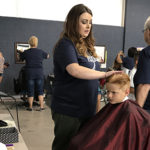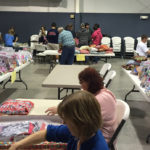Fond memories of a major event Segunda Iglesia Bautista in San Angelo once celebrated had been lost. Because of its difficult history, recollections of the event had been as buried as the time capsule that contained mementos of better days.
In one respect, the church grew up with a difficult history due to discrimination and prejudice, but in recent years, most of its problems came from within.
Time to heal and restore
Four years ago, the church called Edgar Trinidad, who had served as a church planter in New England and Puerto Rico, as well as Texas. Trinidad knew Segunda had experienced challenges, and the congregation needed to heal.
“Segunda built a new church building in 1964, which is where we still are, but nothing had changed much since that time,” Trinidad said.
Internally, the church was decaying, he noted. Like the building that housed the congregation, a lot of repairs were necessary.
For a year and a half, Trinidad guided the church through a difficult time of healing, he said.
“The church decided to make changes, and those changes can be painful, because you will face resistance and uncertainty,” Trinidad said. “That uncertainty can be the most challenging part.”
But the church grew from 25 people meeting every Sunday to more than 150 people gathering each week before COVID-19 hit.
Rekindling memories
The church used funds it had saved to renovate its building. As word spread about the changes at Segunda, some people called Trinidad to schedule a visit of the church.
Sign up for our weekly edition and get all our headlines in your inbox on Thursdays

“An older lady came to me and asked if she could walk around the church one day, and I gladly welcomed her,” Trinidad said.
As she walked around she suddenly stopped. With tears in her eyes, she told Trinidad she had grown up attending the church.
Then she asked Trinidad if the time capsule was still there. Trinidad knew nothing about it.
Later, another pastor in San Angelo whose grandfather had been pastor of Segunda in the 1960s told Trinidad that when the church building was dedicated in 1964, a time capsule had been placed behind the plaque to commemorate the event.
When Trinidad opened the time capsule, one of the items that caught his attention the most was an issue of the Baptist Standard. A newsletter printed on the newspaper’s back cover announced the dedication of the new church building.
Victory in a challenging time
Trinidad noted 1964 as a challenging but fruitful year in the Civil Rights Movement—the time when the Civil Rights Act that ended segregation of public places became law and Martin Luther King Jr. received the Nobel Peace Prize.

For Hispanics in San Angelo, most of whom came from a Mexican background, discrimination had been and would continue to be a normal experience for them well into the 1980s, Trinidad explained.
“Even until the 1980s, many businesses denied service to Hispanics,” Trinidad noted. “So, Hispanics here grew up witnessing racism constantly, and yet still Hispanics continued to grow.”
Agriculture and oil provide the foundation of the economy in San Angelo, and the people who provided labor for those businesses were Hispanics, he said. Hispanics worked hard and became an essential part of San Angelo, he added.
Now, Segunda remains as the only church in the neighborhood called “La Villa” or “La Villita,” and every area of its ministry is in Spanish.
Hispanics in the San Angelo area make up 48 percent of the population, and 36 percent of them speak Spanish at home, Trinidad noted. Nearly three quarters of Hispanic millennials in San Angelo—72 percent—prefer speaking Spanish at home.
Developing an online presence
Even though Segunda went through some difficult times and resisted change in some respects, it built a successful online presence—even before the COVID-19 pandemic forced many churches to develop online resources in a hurry.
Nearly 20 years ago, Trinidad noticed the shift universities were making toward distance learning and thought churches needed to prepare for that. While it took time, Segunda invested well in technology.
Prior to COVID-19, Segunda already broadcasted its worship service in high-resolution online. For a time, it was the only Hispanic church in the area using Facebook, YouTube, Amazon Prime Video, Apple TV, Uno Red and various other media.
People from 15 to 20 Latin American countries tuned in online, which means Segunda potentially was reaching close to a million people every week.
Broadcasting increased Segunda’s reach massively. Although the church already had started churches in Ballinger, El Paso and had plans to start one on the other side of San Angelo, the congregation began receiving communication from Latin American groups calling themselves part of their church.
“Suddenly, we were working in South America without us even knowing,” Trinidad said. “I received a message from a congregation in Chile saying, ‘Pastor Trinidad, we want to inform you we are a group here in Chile that have been discipled by your church.’
“When I asked why they were saying that, they told me a group of around 20 people has been meeting at a house where they have a worship service. And when I start preaching, they turn on the TV so they can watch the sermon.”
Trinidad has heard similar stories from groups in Mexico, Nicaragua and Argentina.
Back to the future
While COVID-19 is new, the early church had to limit assemblies to just house gatherings because of persecution, Trinidad noted. Often, Christians’ creativity helped them find other locations where they could gather in secret, he added.
As universities have realized, learning can be done from a distance, Trinidad said. So, churches should not fight the concept of teaching and learning from a distance, he said.
But fellowship does not change, he added. Individuals will have to still seek to know and spend time with each other. It just does not have to be with everyone present at the same time, Trinidad said.

“Christians must study how to learn and how to gather,” Trinidad said. “That means that although they can learn online, from a distance, fellowship still must happen through personal connection.”
Without losing trust in who God is, Trinidad insisted churches must pay attention to how God is working in this time of uncertainty.
“Maybe this is a time for us to learn new lessons and consider many other options,” Trinidad said. “I think this time has come so we can see those options and learn from them.”
While COVID-19 affected the lives of Segunda’s members and the ways in which they gather, it also helped the church reach many people it may not have been able to reach before, he observed.
Following federal, state and local guidelines, Segunda partially opened its doors in May.
The church meets individuals outside, where volunteers take their temperature and ask screening questions regarding their health. Church services are held in several rooms, and the number of individuals in each room is limited. Segunda offers a separate service for elderly individuals and people with lowered immunity.
But again, Trinidad said, this is an opportunity to grow and learn.
“Church had to come into this new reality,” Trinidad asserted. “The church must learn to be a church and not a religion. People must worship in their homes and read their Bibles in their homes. They must go beyond those four walls, learn to depend on God and not a building or a structure.”
Persecution or no persecution, pandemic virus or no pandemic virus, the church must continue being the church and adapt, he commented.
“We did not close the church. We just changed the way of gathering together,” Trinidad said.














We seek to connect God’s story and God’s people around the world. To learn more about God’s story, click here.
Send comments and feedback to Eric Black, our editor. For comments to be published, please specify “letter to the editor.” Maximum length for publication is 300 words.